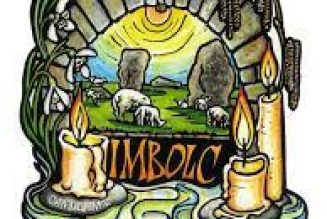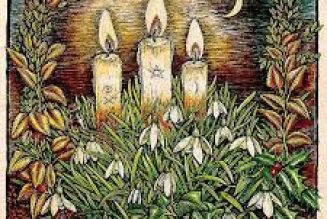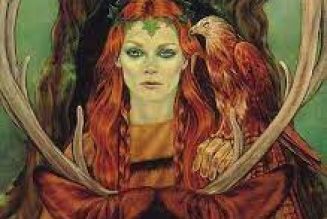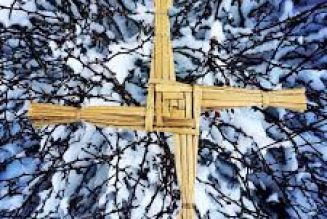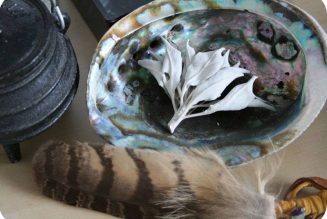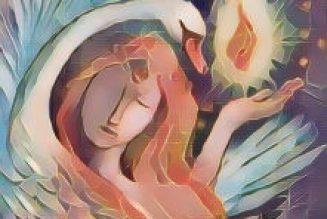Although traditionally Imbolc is associated with Brighid, the Irish goddess of hearth and home, there are a number of other deities who are represented at this time of year. Thanks to Valentine’s Day, many gods and goddesses of love and fertility are honored at this time.
ARADIA (ITALIAN)
Popularized by Charles Godfrey Leland in Gospel of the Witches, she is the virginal daughter of Diana. There is some question about Leland’s scholarship, and Aradia may be a corruption of Herodias from the Old Testament, according to Ronald Hutton and other academics.
AENGHUS OG (CELTIC)
This young god was most likely a god of love, youthful beauty and poetic inspiration. At one time, Aenghus went to a magical lake and found 150 girls chained together — one of them was the girl he loved, Caer Ibormeith. All the other girls were magically turned into swans every second Samhain, and Aenghus was told he could marry Caer if he was able to identify her as a swan. Aengus succeeded, and turned himself into a swan so he could join her. They flew away together, singing exquisite music that lulled its listeners to sleep.
APHRODITE (GREEK)
A goddess of love, Aphrodite was known for her sexual escapades, and took a number of lovers. She was also seen as a goddess of love between men and women, and her annual festival was called the Aphrodisiac. Like many of the other Greek gods, she spent a lot of time meddling in the affairs of mortals, mostly for her own amusement.
She was instrumental in the cause of the Trojan War; Aphrodite offered Helen of Sparta to Paris, the prince of Troy, and then when he saw Helen for the first time, Aphrodite made sure he was inflamed with lust, thus leading to Helen’s abduction and a decade of war. Despite her image as a goddess of love and beautiful things, Aphrodite also has a vengeful side.
At her temple in Corinth, revelers often paid tribute to Aphrodite by having rambunctious sex with her priestesses. The temple was later destroyed by the Romans, and not rebuilt, but fertility rites appear to have continued in the area.
BAST (EGYPTIAN)
This cat goddess was known throughout Egypt as a fierce protector. Later on, during the Classical period, she emerged as Bastet, a slightly softer, more gentle incarnation. As Bastet, she was regarded more as a domestic cat than a lioness. However, because of her position as a guardian, she often was seen as a protector of mothers — as a cat to her kittens — and childbirth. Thus, she evolved into the identity of hearth goddess, much like Brighid in the Celtic lands.
CERES (ROMAN)
This Roman agricultural goddess was a benefactor of farmers. Crops planted in her name flourished, particularly grains — in fact, the word “cereal” comes from her name. Virgil cites Ceres as part of a trinity, along with Liber and Libera, two other agricultural gods. Rituals were performed in her honor prior to spring, so that fields could be fertile and crops would grow. Cato recommends sacrificing a sow to Ceres before the harvest actually begins, as a gesture of appreciation.
CERRIDWEN (CELTIC)
Cerridwen represents powers of prophecy, and is the keeper of the cauldron of knowledge and inspiration in the Underworld. In one part of the Mabinogion, Cerridwen pursues Gwion through a cycle of seasons — beginning in the spring — when in the form of a hen, she swallows Gwion, disguised as an ear of corn. Nine months later, she gives birth to Taliesen, the greatest of the Welsh poets. Because of her wisdom, Cerridwen is often granted the status of Crone, which in turn equates her with the darker aspect of the Triple Goddess. She is both the Mother and the Crone; many modern Pagans honor Cerridwen for her close association to the full moon.
EROS (GREEK)
This lusty god was worshipped as a fertility deity. In some myths, he appears as the son of Aphrodite by Ares — the god of war having conquered the goddess of love.
His Roman contemporary was Cupid. In early Greece, no one paid much attention to Eros, but eventually he earned a cult of his own in Thespiae. He also was part of a cult along with Aphrodite in Athens.
FAUNUS (ROMAN)
This agricultural god was honored by the ancient Romans as part of the festival of Lupercalia, held every year in the middle of February. Faunus is very similar to the Greek god Pan.
GAIA (GREEK)
Gaia is the mother of all things in Greek legend. She is the earth and sea, the mountains and forests. During the weeks leading up to spring, she is becoming warmer each day as the soil grows more fertile. Gaia herself caused life to spring forth from the earth, and is also the name given to the magical energy that makes certain locations sacred. The Oracle at Delphi was believed to be the most powerful prophetic site on earth, and was considered the center of the world, due to Gaia’s energy.
HESTIA (GREEK)
This goddess watched over domesticity and the family. She was given the first offering at any sacrifice made in the home. On a public level, the local town hall served as a shrine for her — any time a new settlement was formed, a flame from the public hearth was taken to the new village from the old one.
PAN (GREEK)
This studly Greek fertility god is well known for his sexual prowess, and is typically portrayed with an impressively erect phallus. Pan learned about self-gratification via masturbation from Hermes, and passed the lessons along to shepherds. His Roman counterpart is Faunus.
Pan is a distinctly sexual god, often described in legends regarding his lusty adventures.
VENUS (ROMAN)
This Roman goddess is associated with not only beauty, but fertility as well. In the early spring, offerings were left in her honor. As Venus Genetrix, she was honored for her role as the ancestress of the Roman people – Julius Caesar claimed to be her direct descendant — and celebrated as a goddess of motherhood and domesticity.
VESTA (ROMAN)
This hearth goddess of Rome was the one who watched over home and family. As a hearth goddess, she was the keeper of the fire and sacred flame. Offerings were thrown into the household fires to seek omens from the future. Vesta is similar in many aspects to Brighid, particularly in her position as a goddess of both home/family and of divination.













